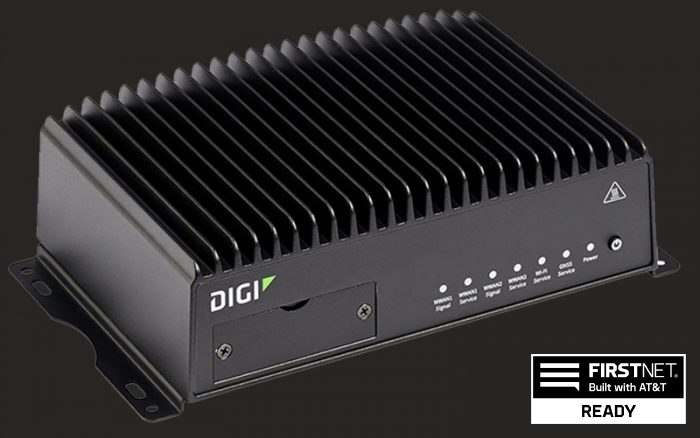Today, emergency responders have the opportunity to improve their connectivity and the reliability and speed of emergency response through dedicated networks offering priority and pre-emptive communications — ensuring that public demand for cellular connections cannot jam the networks. The need for fast, accurate first responder communications is especially critical in a large-scale public emergency.
While FirstNet® and Band 14 are closely related, they are not the same. This blog post examines each part and explains how the two are related and where they are different. It also clears up some confusion in the industry, and provides an introduction to
FirstNet® compatible devices.
There is a common misconception when it comes to FirstNet and Band 14. The FirstNet network, powered by AT&T, does not exclusively operate on Band 14. And Band 14 is not exclusive to FirstNet.
What Is FirstNet®?
FirstNet® is a cellular network communications system designed to deliver priority and pre-emptive communications for first responders and other organizations involved in critical infrastructure and public health and safety. Developed in a public-private collaboration between the First Responder Network Authority and AT&T, the network is built to close communications gaps in public emergencies.
The key objective for FirstNet® is to handle maximum first responder traffic even during a peak emergency. Since FirstNet can only be used by those with a specialized device, there is almost no risk of the network going down or for network congestion by non-FirstNet users. This robust design makes it a cornerstone of strategic planning for smart cities.
While communications with emergency responders are critical at any time, the stakes are especially high during catastrophic events that affect a large population. When a city, region, state or the nation experiences a natural disaster or a terrorist attack — most memorably, events such as the 9/11 disaster, Hurricane Katrina and the Boston bombing — cellular networks can quickly become overloaded, preventing dispatchers and first responders from communicating quickly and effectively.
If you are responsible for critical communications in a municipality, in which police stations, fire stations, and other emergency service providers depend on cellular networks for communications, today you have the opportunity to improve your city’s disaster preparedness with FirstNet communications.
Many other organizations qualify too, including hospitals, ambulance services and a second tier of services known as “extended primary.” These include critical infrastructure systems and services such as water treatment plants, the power grid and security services.
What Is Band 14, and How Does It Work?

The need for a first responder network with dedicated spectrum was recognized in the wake of September 11th 2001, after first responders found it difficult to communicate on the congested cellphone network. In 2012, Congress passed the Spectrum Act. This act set aside 20 MHz of highly desirable spectrum in the 700 MHz frequency band, known as Band 14, which was to be reserved exclusively for emergency communications. Low-band spectrum like the 700 MHz band provides several advantages, including the ability to better penetrate walls and other obstacles. It helps to ensure excellent coverage.
It has been less than ten years since the Spectrum Act was passed, but already the FirstNet network can be accessed by 99% of the U.S. population. This rapid expansion in coverage can be attributed to AT&T’s strategy to give FirstNet users access to all bands on the AT&T network with priority and pre-emption over non-FirstNet users. This means that if there is a signal, FirstNet users will have coverage, even in remote areas where Band 14 may not be deployed yet.
Who Owns FirstNet and Band 14?
FirstNet is owned by the First Responder Network Authority, an independent authority within the U.S. Department of Commerce. Chartered in 2012, its mission is to ensure the building, deployment, and operation of the nationwide broadband network that equips first responders to save lives and protect U.S. communities.
Band 14 is maintained through a public and private collaboration. The Spectrum Act allocated about $7 billion to kickstart construction. However, a majority of the funding comes from AT&T. Over the course of 25 years, it is expected that AT&T will spend in upwards of $40 billion to build and operate Band 14.
In exchange, AT&T can run normal commercial traffic across the band when everything is working properly. However, in the event of an emergency, AT&T will give FirstNet® users priority and pre-emption over non-FirstNet users and, if necessary, drop all commercial traffic and dedicate the network exclusively to first responders, along with the extended primary group as bandwidth allows. For this reason, a normal cellphone might stop working during a crisis, but a FirstNet-enabled device will continue to work.
How Do I Qualify for FirstNet and Band 14?

The idea behind FirstNet is for important first responders, city services and infrastructure to continue functioning in the event of an emergency. Given that mandate, the list of FirstNet approved organizations is broad. In fact, many organizations are surprised to find they qualify.
For example, drilling and gas wells all qualify for FirstNet, as do Internet connected irrigation systems, waste disposal and septic tank services. Both short and long haul railroad carriers can use the network, as can the postal service and other private postal carriers.
The list of extended primary services also includes highway and bridge construction projects, chemical engineering services, school bus systems, various airport and air control functionaries as well as transportation and licensing providers. It is worth investigating, if you think that your company or organization might qualify.
What Devices Support FirstNet and Band 14?
When it comes to FirstNet compatibility, there are two categories of devices:
- Products that meet FirstNet requirements, pass certifications, and support all FirstNet features and support band 14. These are known as FirstNet Ready™.
- Products that meet FirstNet requirements, pass certifications, and support all FirstNet features but do not support band 14. These do not have a FirstNet Ready designation.
For best FirstNet performance, you want to select a device that is FirstNet Ready™.
Some of Samsung’s Band 14 compatible devices include the Galaxy S10, Galaxy Note9, Galaxy S9 and the Galaxy Tab S4 tablet. These top-of-the-line phones are a far cry from the hefty bricks that one might associate with emergency backup communications.
Various models of the Apple iPhone can also access the network. The iPhone XS, iPhone XS Max and iPhone XR can connect to the FirstNet network, as can iPhone 11 and iPhone 11 Pro.
Infrastructure Systems that Support FirstNet and Band 14 Communications

While it’s important for individual police officers, fire fighters and EMTs to have a Band 14-enabled cellphone, perhaps nothing is more important than a FirstNet Ready™ cellular router. These devices can provide the communications backbone to ensure that an entire hospital, police station, power plant or water treatment facility remains connected to the Internet in an emergency.
The IoT supports critical communications for public safety services, hospitals and first responders. Smart traffic management systems depend on high data throughput and the most reliable communications networks, as these systems are critical for everything from daily traffic management and emergency vehicle routing to a city-wide evacuation.
To learn more about how FirstNet compatible devices support mission critical communications in traffic management systems, see our case study on New York City's deployment of Digi cellular routers in 14,000 intersections across the city's five boroughs.
Digi’s FirstNet and Band 14 Solution
 Digi has a growing offering of devices that are certified for operation on the FirstNet® network. The FirstNet Ready™ Digi TX54 cellular router is designed for these mission-critical applications, functioning as a central communications gateway for smart traffic management systems and Band 14 communications. This robust, secure device is designed to withstand tough conditions, support multiple connectivity requirements simultaneously and maintain the fastest connections with the highest availability.
Digi has a growing offering of devices that are certified for operation on the FirstNet® network. The FirstNet Ready™ Digi TX54 cellular router is designed for these mission-critical applications, functioning as a central communications gateway for smart traffic management systems and Band 14 communications. This robust, secure device is designed to withstand tough conditions, support multiple connectivity requirements simultaneously and maintain the fastest connections with the highest availability.
Today, Digi is working with municipalities across the U.S. to deploy the critical FirstNet Band 14 communications backbone to support emergency response, smart traffic management systems and future connected vehicles. Contact us to learn more about how these systems can support your city’s critical communications.
Expanding Band 14 Across Public Health and Safety
Congress mandated the deployment of FirstNet Band 14 to ensure critical communications occur without delays during a disaster. To that end, the U.S. government would like to see as many critical infrastructure organizations and emergency service providers connected and prepared as possible. If you think that your institution may qualify for a Band 14 connection don’t wait. Make sure you’re prepared for the unforeseen in your city.
Get in touch to discuss how to prepare your city and public services prepared for public emergencies with FirstNet® compatible devices.
Note: This blog post was initially published in 2019, and was updated in July, 2021.